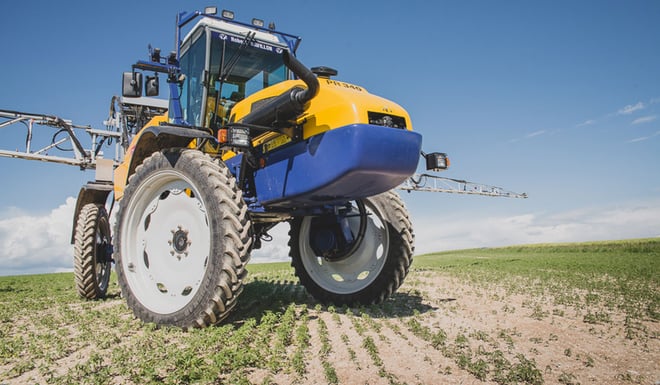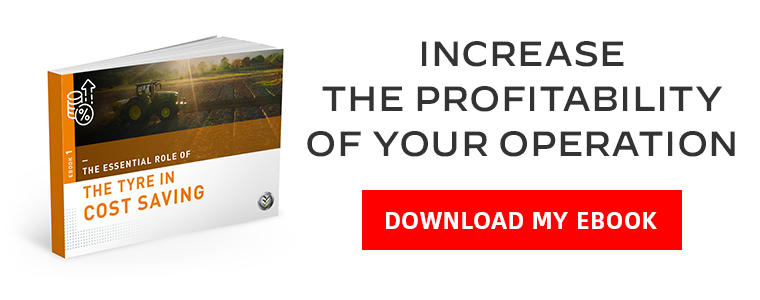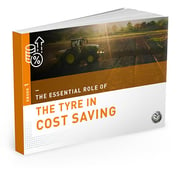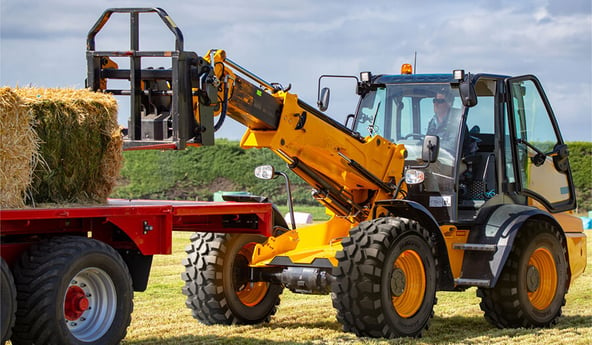Sprayers, whether towed or self-propelled, drive repetitively and always in the same part of a field.
This is why it is particularly important to choose the right tyres to reduce the impact of your machine’s wheels on your crops in the driving zones, limit loss of yield and increase your productivity.
What are the requirements for sprayer tyres?
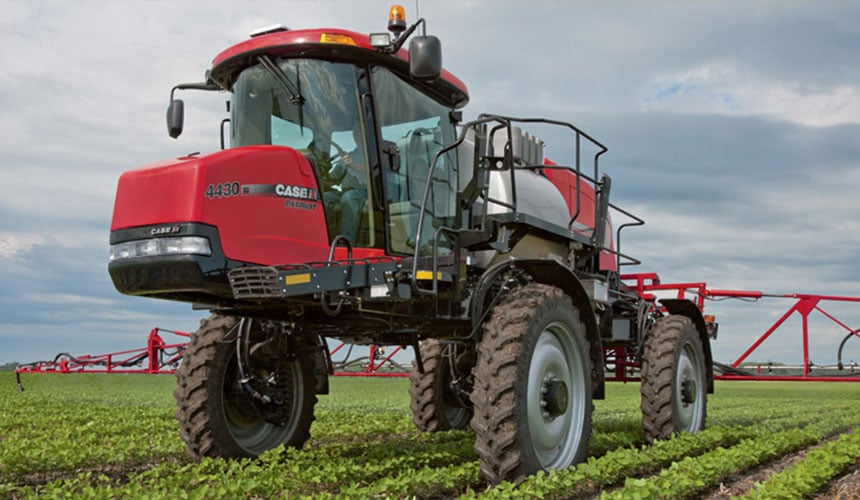
The choice is tricky as there are numerous points to consider for this type of agricultural tyre.
Tractors with sprayers or self-propelled sprayers drive both on road and field, which explains the sometimes-contradictory requirements. In addition, the time slots for applying phytosanitary products or fertiliser are often very restrictive depending on the weather (rain, wind, etc…) it is not always possible to wait for the perfect conditions which would limit the impact on crops as well as soil compaction.
The tyres need to protect the soil from compaction, whatever the weather conditions. Due to their flexibility and their capacity to spread the load, radial type tyres are often recommended for sprayers.
How to choose between WIDE OR NARROW WHEELS
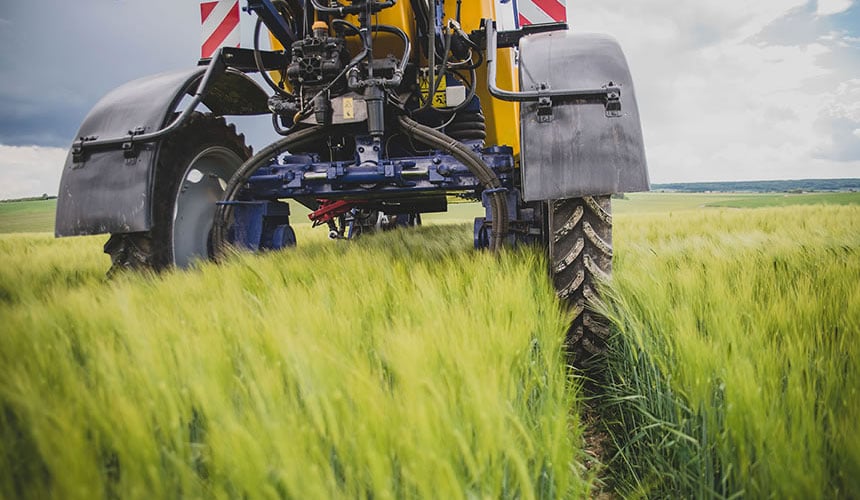
You need to determine the most suitable size. Choosing between wide or narrow wheels depends primarily on the type of crops. For crops in rows for example (market gardening, viticulture…), the width of the wheels depends on the distance between the rows, determined during planting.
The type of soil, and its load-bearing capacity and tendency towards compaction will also have an important influence.
Wide wheels are often preferred at the start of the season when the soil is damp and the vegetation not yet much developed. A wider wheel spreads the load on the ground for more stability on slopes.
When the plants are more developed and if the soil is not too sensitive to compaction, we advise that you replace the larger wheels by narrower wheels which will cause less damage to crops. Changing the wheels is often fastidious but you can use a wheel manipulator. The drawback is that you lose out on driving comfort as narrower wheels have less air and lessen shock absorption.
Larger tyres can also be used for higher growing crops (sunflower or rape for example) to protect the plants in the rows, between the wheels.
Why should you use VF TYRES FOR YOUR SELF-PROPELLED SPRAYERS?
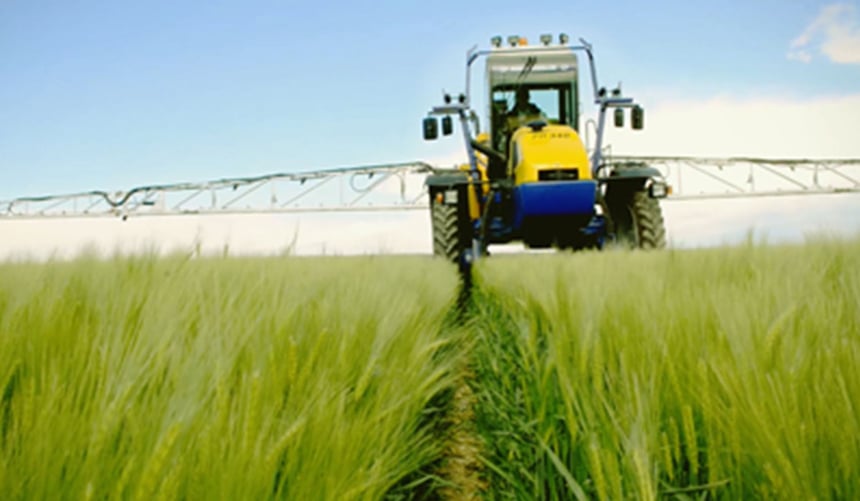 For self-propelled sprayers, tyres must also provide enough traction. This is how VF tyres, similar to those used for tractors or harvesting machines, began to develop. The advantage is their capacity to carry higher loads for the same pressure. They are therefore particularly interesting when the weather is wet, and the work needs to be carried out without delay.
For self-propelled sprayers, tyres must also provide enough traction. This is how VF tyres, similar to those used for tractors or harvesting machines, began to develop. The advantage is their capacity to carry higher loads for the same pressure. They are therefore particularly interesting when the weather is wet, and the work needs to be carried out without delay.
This type of tyre limits the creation of deep ruts which make driving difficult in the fields during subsequent work and encouraging the erosion of sloping fields.
Pressure adjustment is unavoidable
Just like trailers, sprayers carry a variable load and drive on both roads and fields (regular farm/field routes).
It is therefore essential to check the tyre pressure regularly. In this case, a central tyre inflation system is a good way to maintain the most suitable pressure at all times.
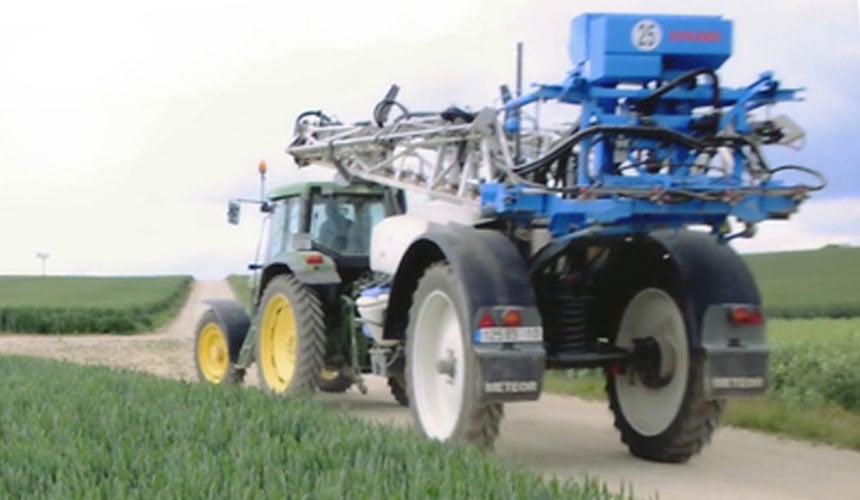
The tyre is the best guarantee of the sprayer’s STABILITY
Tyre stability is important to optimise the boom’s steadiness and precision in the application of phytosanitary products.
It can be altered by the movement of the liquid contained in the tanks if the tyres do not sufficiently absorb vibrations.
The size of your tyres, in relation to your sprayer, and their profile will be decisive.
Self-cleaning of tyres
Choose a self-cleaning agricultural tyre, in other words a tyre which doesn’t gather a lot of earth. For this, widely spaced lugs are better than tighter lugs. You will limit the deposits of earth on the road or in the farmyard, and it will be easier to clean.
The Bridgestone-agriculture.eu blog is written and administered by agricultural tyre experts who are available to provide you with the advice you need on the subject of your tyres. They can help you to maximise your productivity with information on all aspects related to tyres: Technical data for agricultural tyres - Agricultural tyre performance - Air pressure advice - Solutions to avoid soil compaction - Sprayer tyre pressure – Why and how to ballast your tractor tyres - The 6 principal mechanical causes of abnormal wear to your tractor tyres – etc…
Further advice is available on the essential role of the tyre by downloading the free eBook below:
Most people who read this article have also read some of the following articles which are listed by order of popularity:
This information is intended only to make you aware of the technical and functional aspects of agricultural tires and their use. It does not allow you to make a judgment or a definitive conclusion on a given problem. Only your agricultural tire expert is able to make a technical assessment and take a final decision, case by case.
Leave a
commentary
Your email address will not be published.
Required fields are indicated with *


